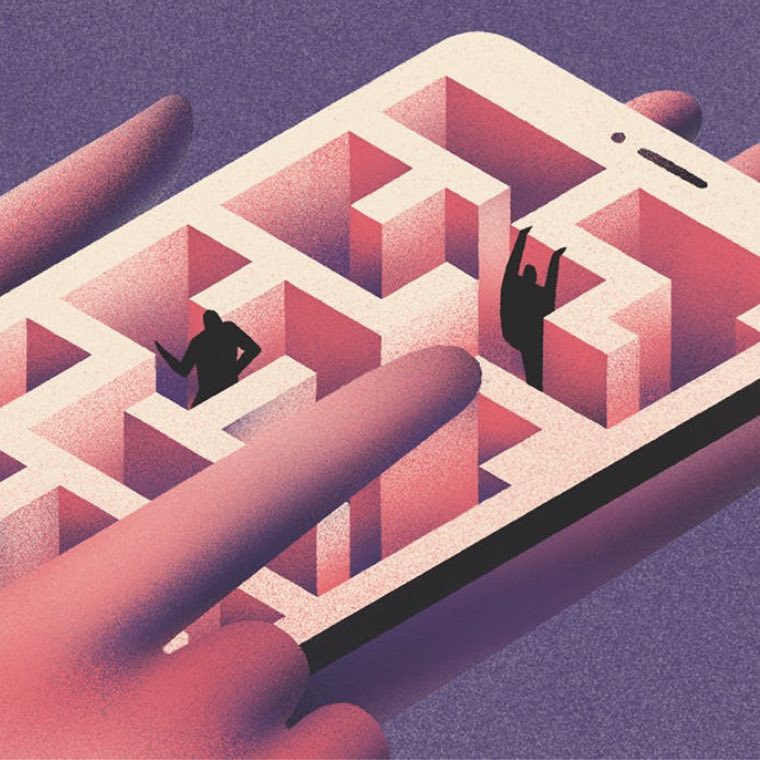
Reflections
Disconnect to connect, a story of digital detox
December 2018Digital detox, or how to love the toxin
Digital detox. You’ve heard the phrase, you know what it means and you’ve probably thought about doing it. You might be reading this very article on your smartphone while commuting or having lunch, and you’re wondering whether you should just put your phone away and decide that at certain times, evenings and weekends perhaps, your phone stays off.
The digital detox is enthusiastically recommended by life coaches and makes its way into companies’ work culture and even into restaurant policies. Perhaps the most stark argument for a digital detox is the plaintive, ‘Mom, can you please put your phone down?’
But what are we detoxing from?
When we’re buried in our phones, we’re usually consuming and sharing news, messages, videos or gossip with members of our ‘psychological neighbourhood’. This is a wide network of people like us, a community of thinkalikes and live-alikes, to which, thanks to the internet and mobile technology, we have unparalleled access.
We communicate with ‘friends’ in the broader, Facebook sense. We create and maintain social bonds and networks, unfettered by time and space. We inform and update, even educate and train, we socialise, gossip and chat, or simply enjoy a moment of escapism and distraction. This is something we humans have always done. So what’s so wrong with it now?
There are plenty of naysayers wielding studies showing that digital media has made us more narcissistic, our attention spans are shrinking, our literacy levels are falling and we’re showing physical symptoms of digital dependence.
We suffer from ‘Facebook’ envy, where we compare ourselves to other people’s seemingly perfect lives and feel unhappier as a result. And then there’s the scourge of ‘false news’ sites. So perhaps the naysayers have a point.
You might never have heard the term nomophobia, which psychiatric researchers call the pathological fear of being with no mobile phone. But you almost certainly know what it feels like. And to some extent you are aware, somewhere deep within you, that this is not good for you.
The term digital detox is, of course, borrowed from the diet world. We attempt to counter the ill effects of all the processed sugar and the fat and bad stuff we’ve consumed over the year by embarking on a week of green smoothies and lemon juice.
But this approach – control and release, indulgence to self-denial and back again – doesn’t work in the long-term, as any yo-yo dieter will tell you. Going cold turkey in our digital routines feels forced, artificial and counter-productive because we could end up missing something – a message, some news – that’s genuinely important.
How to learn from the toxin
Let’s take a closer look at why we threw ourselves into the arms of social media in the first place. We are social beings. We crave approval and recognition and much of our sense of self, our identity and happiness depends on having ourselves mirrored back to us.
Social media, particularly Facebook, has capitalised on this innate need. The company found that the best way to capture our attention, and hold it, was to offer “a little dopamine hit” that comes with every ‘like’ we receive. We’ve become hooked on an addictive “social-validation feedback loop” (the words that ex-Facebook president Sean Parker used in an interview with Axios).
So, we get a dopamine reward for social validation. Maybe we should be trying to get that offline instead.
Closely related to this ‘social echo’ is the fact that we find it difficult to stay away from social conventions. We don’t want to risk exclusion (or, to use social media parlance, we suffer from FOMO, the fear of missing out). But we’ve always had a choice over how much we participate. Maybe if we learn how to stay away sometimes, we can learn how to participate more consciously.
Then there’s the simple need for escapism, a break from being ourselves, from overwhelming emotions, conflicts and demands. The life we lead behind avatars, fighting fantasy battles, dreaming ourselves away in romance, crying over constructed tragedy, shows a need for catharsis, which is as old as Greek tragedy. Let’s embrace these escapes – and then return to real life in all its full-coloured glory.
Thank you, toxic media, I like your comment
Instead of worrying about what digital media is doing to us, maybe we should be thanking it for mirroring so clearly back to us who we are and what we need. If we get a ‘little dopamine hit’ we get when someone says “I like what you do, it makes me happy” online, maybe we should be saying it daily in real life conversations, many times over.
We should also be saying “No, I don’t want to communicate right now. I can’t meet your expectations.” Only when we learn how to say no does ‘yes’ become meaningful. Let’s give genuine yeses to the world.
And finally, let’s face our emotions, both the scary and the delightful, as challenging, arousing and heartbreaking they might be. We crave life, so let’s live and stop escaping.
A meaningful digital detox might be to start taking ourselves seriously, to listen carefully to what we need and what positive things we might gain from our digital practice. Then we can embrace the possibilities of digital media, but this time with some more balance – because this time it will be based on choice.
